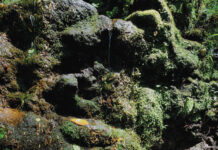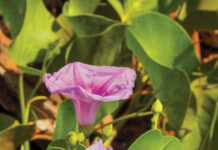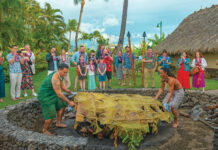By Sky Barnhart
 Steam rises from the glowing rocks, filling the darkness with heavy heat. Herbs laid on the hot stones give off a rich, ancient scent as they release their healing qualities. We inhale, deeply, the smell of ‘olena (Hawaiian turmeric) and sandalwood. The embers hiss as someone shakes more water from ti leaves onto the stones. The rocks glow brightly, briefly. Furious steam rises, stinging our nostrils, cleansing our sinuses. We exhale, slowly, haaaaa. . . .
Steam rises from the glowing rocks, filling the darkness with heavy heat. Herbs laid on the hot stones give off a rich, ancient scent as they release their healing qualities. We inhale, deeply, the smell of ‘olena (Hawaiian turmeric) and sandalwood. The embers hiss as someone shakes more water from ti leaves onto the stones. The rocks glow brightly, briefly. Furious steam rises, stinging our nostrils, cleansing our sinuses. We exhale, slowly, haaaaa. . . .
Crosslegged on a circle of lau hala mats around the hot stone pit, we come together in a hale pulo‘ulo‘u (house of purification). Long forgotten or disregarded, the Native Hawaiian use of steam is now experiencing a revival as part of modern Hawaiian healing techniques.
“Hawaiians were world voyagers with a deep understanding of navigation, agriculture, and concepts like lomilomi (Hawaiian massage) and ho‘oponopono, (forgiveness, realignment) just to mention a few, that are only now coming to the surface,” says Kauka (Dr.) Maka‘ala Yates, founder of the Hawaiian Healing Institute, which provides training on traditional healing modalities. Yates, who sailed on the original Hokule‘a voyaging canoe in 1976, says that, “Like navigation, a hale pulo‘ulo‘u has never happened for hundreds of years, so we are bringing it back through educational programs and reintroducing it to the Hawaiian people.”
Although there is little documentation on hale pulo‘ulo‘u, this does not mean it didn’t exist, according to Keli‘i Tau‘a, a kumu hula and Hawaiian language instructor at Maui Community College. “Writing wasn’t the Hawaiian way. . . . they passed [the information] down through the chants, from family to family. The tradition of sweating was passed down from father to son, like the tradition of bathing. You usually sweated with your family because it’s a very personal thing.”
The purpose of sweating was to cleanse and heal. “We don’t know who started the tradition, as we don’t know who started celestial navigation or who wrote the Kumulipo [Hawaiian creation chant], but we do know why sweat was an important part of our culture,” Yates says. “The obvious reason is for health.





